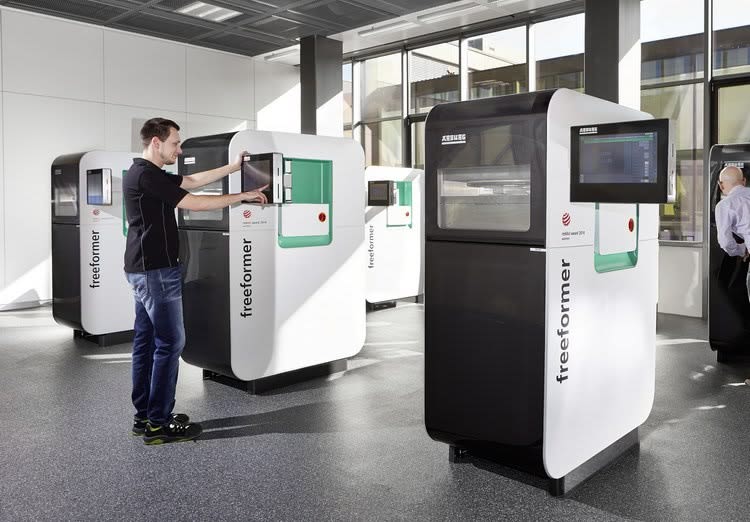Individualisation of high-volume parts
Above and beyond the additive manufacture of one-off parts and small batches, high-volume parts can also be enhanced and customer wishes incorporated directly in the value chain by combining additive manufacturing, injection moulding and Industry 4.0 technologies. Arburg is a pioneer with regard to Industry 4.0 and the fully automated production of customised high-volume parts as single-unit batches. The company's range of services also includes central, transparent production planning, monitoring and quality documentation via the Arburg host computer system (ALS). The specialists from Arburg will be available to interested trade visitors to comprehensively any questions they may have in this context.Industrial additive manufacturing of functional parts
Arburg also demonstrates that Arburg Plastic Freeforming (APF) is not only suitable for prototyping but also for the industrial additive manufacturing of functional components in particular. As a rule, there are no limits to the industries and fields of application that the open system can cater to. One great advantage of the Freeformer and the APF process is that the process, and therefore the manufacture of parts, can be adapted precisely to the requirements at hand. Freeformer users can qualify their own original material and match the freely programmable process parameters specifically to the application at hand. In addition to amorphous standard granulates such as ABS, PA and PC, the ever-expanding range of materials qualified by Arburg includes, for example, elastic TPE or aerospace industry-approved PC for the production of parts such as air ducts. The Freeformer currently boasts a unique selling proposition with the processing of original PP. It used the semi-crystalline material and the associated support material armat 12 to produce parts such as cable clips with delicate structures and click effect.Additive processing of two components
The Freeformer is equipped with two discharge units as standard. This enables it to process an additional component in order to manufacture a part in different colours, with special tactile qualities, or as a hard/soft combination, for example. In order to implement complex geometries, support structures can be used as the second component. Different water and alkali-soluble materials are used for this purpose. In developing new support materials for the Freeformer, Arburg collaborates with universities and established material partners. The water-soluble support material Armat 12 has been specially designed for processing PP. Moreover, the water-soluble support material Armat 11 has been further improved. With Armat 21, an alkaline-soluble alternative is also available.
Sample parts are produced on six Freeformers in the Arburg Prototyping Center in response to customer inquiries.
Source: Arburg




